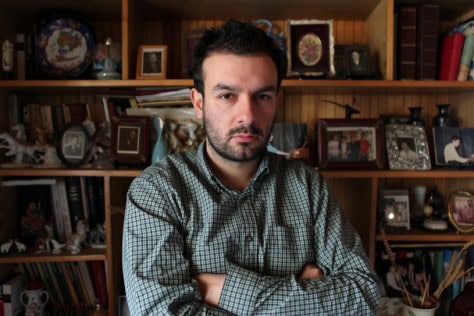Think of it like Lent for atheists—you give up something that you depend on (chocolate, cigarettes, kinky sex) and in return you gain a new perspective and a fresh understanding. The practice isn’t solely useful for kicking our vices, however. For those facing the horror of the metaphorical blank page (or canvas, 8-track, film reel, etc.), sticking to self-imposed rules and regulations can often provide that all-important shove out of a creative rut. Lars von Trier knew this when he threw out non-digital cameras, polished soundtracks and other crutches in the race toward a brighter, lighter Dogme future, but this sort of constricting regimen isn’t solely for the crazy Danes. There’s a simple paradox at work: sometimes tying yourself down can be the trick to freeing up just about everything.
Who knows, for instance, what it is that compels a man to draft an entire novel without recourse to the letter ‘e’? Georges Perec (who did just this in The Void) is dead, so we can’t inquire of the French experimental novelist directly (nor can we ask him how many times he might have punched the wall in rage, dying to type out agonie or colère). Sometimes it’s a negative rule that can nudge the creative process in a unique direction—a firm commandment not to do something, whether that’s using a certain letter, color or cinematic technique. In other instances, abiding by the rules of a difficult and time-consuming process are what keeps an artist honest—it’s why 35mm photography will never really be killed by digital, and why there’s still patience for agonizingly inefficient practices like lithograph and metal etching.
HOW TO BE SAVED BY A GARBAGE PIANO
Let’s say a deadline is what you need: a firm, unbendable, take-no-prisoners deadline that will mercilessly bitch slap away your lack of motivation. Here’s a completely made-up statistic: 92.8 percent of all creative people are terrible procrastinators who will only complete work when someone or something is forcing them to, with dire physical violence as the punishment for laziness.
Perhaps members of this imaginary majority themselves, New York favorites Bishop Allen decided to record and release an EP every month in 2006. “The project was born out of intense frustration,” says frontman Jason Rice, who also starred as the starry-eyed musician in Andrew Bujalski’s Mutual Appreciation. “After touring behind our first record, we started trying to record a follow-up. We worked on the same twelve songs, day after day, month after month, for over a year—for some reason, we couldn’t finish them.” Their writer’s block was cured, amazingly, by a rather crapulent and decrepit piano they found on a Brooklyn street. The band used the recovered instrument for songwriting, “to resuscitate it at first, then for the sheer joy of playing.” An unexpected change of pace altered Bishop Allen’s entire process, and eventually the previous dozen, unformed tracks were abandoned. “We remembered what we liked about making music. The songs started to pile up—nothing complete, just fragments, observations and ideas—and we started to realize how much we liked working on new things.”
It was enough of an exponential inspiration to push the band toward a personal challenge: record a four-song EP every month, for an entire year. They completed the project over 2006, writing and recording simultaneously, borrowing friends and instruments for one-off cameos. “The thing is that pop songs are already defined by their constraints. They need a certain rhythm to fit with the music; I tend to work with a limited number of syllables, and more often than not, I need to build rhymes in one way or another. And indie recordings are also defined by constraints, many of them technical. We did record all of the May EP without drums—because we couldn’t get an acceptable drum sound. We didn’t use any Hammond organ, tympani, contrabass or pedal steel because, though we did have ideas for all of them, we couldn’t get our hands on them.”
When asked to contemplate a future rule to impose on his creative process, Rice offered a nice multidisciplinary angle. “It would be a requirement for action rather than a restriction,” he says. “I would make myself pick twenty picks, and write a song about each one. That way, the thing I’m making myself do gives me cause to move faster rather than hobbling me. It’s like setting my alarm—in the morning, it rings arbitrarily, but it gets me out of bed.”
For Brooklyn songsmith Paleo (aka David Strackany), his own regimen came down to a song a day. He’s committed himself to writing and recording a single track to fill each slot of the calender, all while touring cross-country—the finished works are then available for download on his briskly utilitarian website, www.paleo.ws. “I had been writing a poem every day for a few months to pass the time while I was working, and the idea just sort of hit me like a piano on April 16th [2006],” he says. “The Song Diary is one thing. It is a novel. But creating continuity in such a sprawl is a challenge, and so there are certain joints that try to hold it all together as one work, rather than (or in addition to) being just a mess of a mass of songs. In poetry, as well as in music, there are standard forms that artists work and play in to their heart's delight. The sonnet, the haiku, the twelve-bar blues, there are standard folk progressions that predict 90 percent of folk songs. I wanted to create my own form that I could invent within.”
Paleo’s daily songs aren’t one-off improvisations; he says a track rarely takes him less than three hours, often much longer, weaving shared lyrical elements into each day’s creation. “If ‘one song every day’ sounds like a rule to you (I'd call it an ingredient), then all music is the sum of its rules. Instruments are rules. Frets. Languages are rules. Identities are rules. Names. Borders. Colors. Songs. I'm using little rules to free myself of the bigger ones.”
INTERMITTENT GUNFIRE (an interlude)
In the 1960s, Fluxus pioneer Dick Higgins set himself an impossible task: to write one thousand symphonies. With the carnage of the Vietnam War looming abroad, there was an obvious and cruel poetic justice at work when he decided to “write” using a machine gun (operated by a New Jersey police officer). The rounds ripped and punctured the blank notation sheets; Higgins later translated the paper’s wounds into concrete scores to be played by a proper orchestra. “The idea was to making something beautiful using the destructive force of the weapon,” explains Hannah Higgins, the late artist’s daughter and author of Fluxus Experience. She notes that her father’s performance involved more than self-imposed, esoteric rules (i.e. “make musical notation using a machine gun.”) “I would be cautious about [those terms] since they seem to suggest an arbitrariness or casual attitude on the part of artists. Even if it may feel that way for the artist, if the work is interesting, the rule is usually causally linked to some hitherto unknown or neglected aspect of the conventional medium or intermedium. For example—while [John] Cage’s chance operations press hard against conventional composition, it is in fact the result of his acknowledging the function of chance in musical performance generally.”
A few decades later, the Jackass crew relit a perverted cousin of the Fluxus impulse for the MTV generation (minus the theoretical foundations or, for that matter, much thought at all). Johnny Knoxville, naked save for a jock strap, was shot from medium-range with a paintball gun. Sadly, no music arose from this pivotal moment in television history.
ANOTHER TWIST FROM THE FATHER OF DOGME
Scottish director Andrea Arnolds’ Red Road was one of the most affecting films of early 2007. Oddly enough, the deeply original work has its origins in a pre-conceived cast of characters brainstormed by Lone Schergif and Anders Thomas Jensen, based on a system of rules devised by (you guessed it) Lars von Trier.
The concept is called The Advance Party, and it flips Dogme’s structural rules around: instead of pinning down the methods and techniques a director can use, it provides a list of seven characters that must be used in the films. Each film must be set in Scotland, and the same actors are to portray their respective characters in all three of the works.
The Advance Party doesn’t mandate which of the characters should be the primary character, so Arnolds chose “Jackie” (defined simply as a 34-year-old who has “lost her only brother, her husband and their child…habitually maintains a relationship with a married man…gets enough intimacy to avoid shutting herself away from the world). In Red Road, Jackie (Kate Dickie) becomes a nuanced woman who works as a CCTV watchperson for Glasgow’s sprawling network of urban security cameras. Arnolds initially started with three potential story drafts that she then vetted around to those involved with The Advanced Party—one was set in a nursing home, another was “more of a road movie,” but all of them included a car crash. (“A car accident is one of those things that does bring people that don’t know each other together,” she explains. “Bit interesting I should choose a car accident as opposed to a wedding…”) The parameters provide boundaries while allowing free creative reign—Arnolds film is an intensely emotional thriller, but she could just as easily have conjured a slapstick romantic comedy from the source material. “The tighter and more restrictive things are, the more you think and work things out,” Arnolds says. “I do think filmmaking is about working with obstacles—you might have an idea in your mind about how it’s going to be, but it always turns out to be different. Your brain starts working when things are not going the way you thought they were going to go.”
Red Road may have been born from a set of sketched boundaries, but the end result has none of the sterility that you might expect from a theoretical exercise. Like the best art that results from self-imposed limitations, rules, or restrictions, it forces us to reconsider the nuts-and-bolts of the creative process itself.
“It's been called a gimmick, but that is a really boring and disappointing way of looking at it,” says song diarist Paleo. “Commerce has stolen the synchronous language of poetry and art and twisted it for the shallowest ends imaginable. Church happens every Sunday, nobody calls that a gimmick. Nobody called the plagues a good publicity stunt.”
The preceding article was written in sub-zero temperatures, with one hand tied behind the back, using a laptop missing the ‘X’ and ‘?’ keys, while a gang of unruly street cats nipped at tuna fish affixed to the writer’s heels.
 Q&A with Larry Gus
Q&A with Larry Gus We Own the Night: The Edison
We Own the Night: The Edison
No Comments